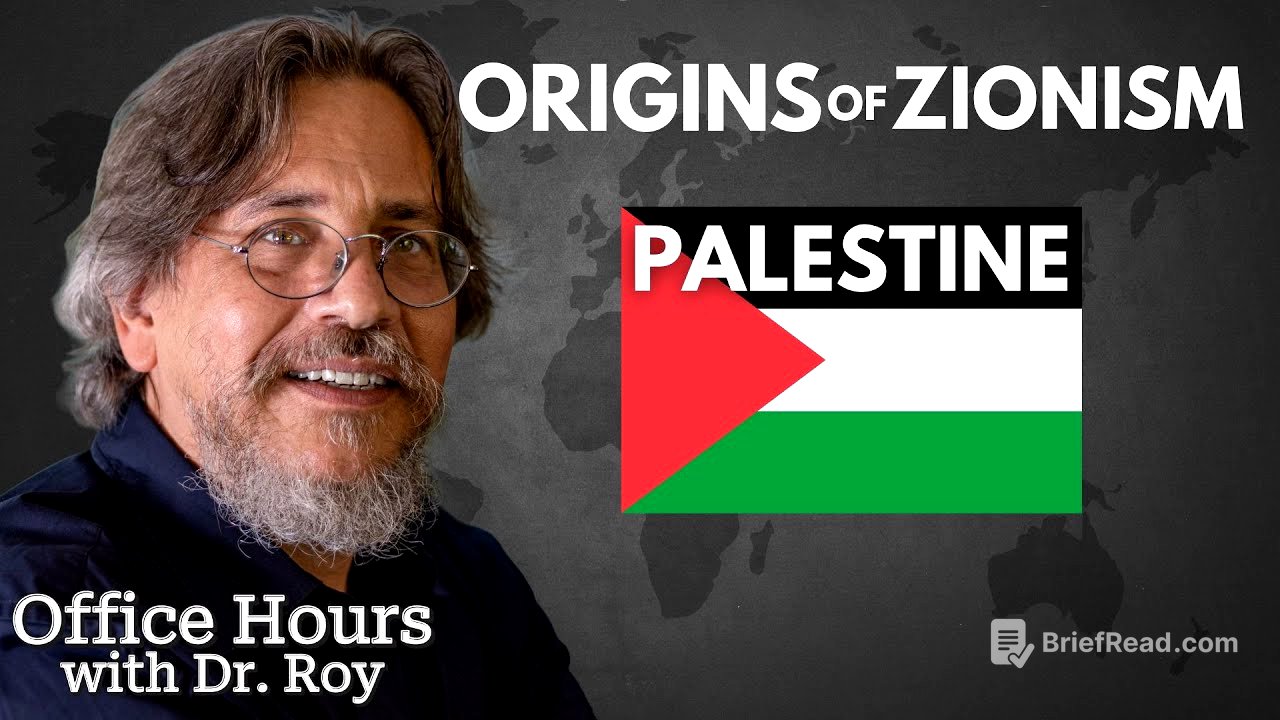TLDR;
This discussion explores the historical roots of the Israeli-Palestinian conflict, starting from ancient times to the events leading to the creation of Israel in 1948. It examines the ancient peoples of the region, the influence of various empires, the rise of Zionism, and the impact of the Holocaust. The conversation also addresses the complexities of anti-Semitism, the role of colonialism, and the displacement of Palestinians.
- Ancient roots of the conflict and the various empires that influenced the region.
- The rise of Zionism and its connection to anti-Semitism.
- The impact of the Holocaust and the events leading to the creation of Israel.
- The displacement of Palestinians and the complexities of the conflict.
Opening: Why Palestine Matters [0:00]
The speakers express their concern and sadness regarding the situation in Palestine, emphasizing the imbalance of power and the suffering of the Palestinian people. They aim to explore the historical context of the conflict, understand the current events, and discuss potential solutions or sources of hope. The discussion is framed as an effort to understand the complex issues and find ways to help those affected by the ongoing crisis.
Ancient Peoples and Early Judaism [1:40]
The discussion begins with the ancient Semitic peoples, including the Canaanites, Phoenicians, and Jews, who inhabited the region of Palestine and Lebanon. These groups were often in conflict, with Judaism emerging around 3,500 years ago, initially as a henotheistic religion that recognized multiple gods but worshipped one in particular. The Jewish population in Palestine was never a majority and was in constant struggle with other Semitic groups, leading to a multi-ethnic and multi-religious environment.
Babylonian Captivity & Persian Rule [6:00]
The Jewish people faced conquest by the Neo-Babylonian Empire, resulting in a period of captivity where talented individuals were forcibly relocated to Babylon. Later, the Persian Empire, under Cyrus the Great, conquered the Neo-Babylonians and freed the Jews from captivity, supporting the rebuilding of the Temple of Solomon. The term "Palestine" originated from the Philistines, one of the sea peoples who invaded the region.
Greeks, Romans, and the Jewish Diaspora [9:56]
Alexander the Great conquered the Persian Empire, bringing Palestine under Greek influence, followed by the Romans. The Jewish population resisted Roman rule, leading to rebellions and Roman cruelty, including the destruction of the Second Temple of Solomon. In the early 7th century, the Romans massacred the Jewish population in Jerusalem, driving many out of Palestine. This event contributed to the Jewish diaspora, with Jewish communities already established in Egypt, Ethiopia, Europe, and Persia.
Arab Conquest and Jewish-Muslim Relations [15:10]
The Arab conquest of the Persian and Roman Empires brought a significant change, as the Arabs treated the Jewish population with respect and as allies. This partnership fostered a strong relationship between Jews, Christians, and Muslims under Arab rule, leading to philosophical advancements. Many Jews sought refuge in the Arab world, such as Morocco, during periods of persecution in Europe.
The Crusades and Christian Antisemitism [17:05]
The Crusades marked a turning point with the first pogroms against Jews in the Rhine River Valley, followed by massacres in Jewish and Muslim communities upon arrival in the Middle East. Crusaders displayed intense hatred towards Jews, burning synagogues and viewing them as impure. This hatred stemmed from the Roman Empire's animosity towards Jews, later fueled by the irrational accusation that Jews killed Christ.
Colonialism and the Rise of Zionism [20:18]
The discussion transitions to the era of colonialism and the emergence of Zionism, a relatively new concept in human history. The United States' history of colonization and mistreatment of Native Americans served as an inspiration for other nations, including South Africa, Nazi Germany, and Zionist movements.
Pogroms, Dreyfus Affair, and Herzl [22:18]
Theodor Herzl, an Austrian Jew, was motivated by the Dreyfus Affair to create a Jewish majority state. The Dreyfus Affair, where a Jewish officer in the French army was wrongly convicted of treason, highlighted the impossibility of Jewish integration into European society due to constant pogroms over 800 years. Herzl initially considered Uganda and other locations for the Jewish state but eventually, Palestine was chosen by most Zionists as their ancient homeland.
Race, Identity, and the Claim to Palestine [29:00]
The concept of race, ethnicity, and nationality is discussed, emphasizing that genetics do not define identity. European Jews, despite centuries of interbreeding, claimed a genetic connection to Palestine, ignoring the existing Palestinian population, who were genetically and ethnically similar, with many having converted to Christianity and Islam. The Zionist narrative of "a land without a people for a people without a land" was false, as Palestine already had a thriving population.
Balfour Declaration & Sykes-Picot [32:02]
The British Empire sought to partition the Ottoman Empire, leading to the Sykes-Picot Agreement, where Britain and France carved up the region. The Balfour Declaration, driven by Zionist and anti-Semitic sentiments, declared Palestine as the Jewish homeland, despite lacking the authority to do so. The British viewed owning Palestine as the fulfillment of the Crusades.
Zionism and Antisemitism Connected [35:10]
Zionism and anti-Semitism were intertwined, with anti-Semites supporting Zionism as a means to expel Jews from Europe. The goal was to remove Jews from Europe, regardless of the destination. The Balfour Declaration aligned with this goal, as it supported the creation of a Jewish state outside of Europe.
Holocaust: From Camps to Final Solution [41:09]
Zionists in Palestine realized they needed to accelerate land acquisition and feared the British would not relinquish control. Jewish terrorist organizations formed, attacking British targets. Lehey, a Zionist group, even met with Adolf Eichmann to facilitate Jewish emigration from Europe. The Nazis, however, eventually adopted the "Final Solution" in 1941, leading to the extermination of Jews in death camps. Zionism, in a way, accepted anti-Semitism by agreeing that Jews could not live safely among white Europeans.
Nazi Racial Policies and IBM Data [47:00]
The initial stages of the Holocaust involved concentration camps that gradually became more cruel. The Nazis deliberately eased Germans into committing atrocities. They sought ordinary people to carry out these acts, testing recruits to avoid sadists and preferring those who would follow orders. Jews tried to flee, but many realized they would not escape. Some joined the German army for safety, as most identified as German first. The Nazis relied on census data from IBM to identify Jews, tracing ancestry to enforce racial policies, as there was no way to convert out of being Jewish.
Hatred, Opportunism, and Power [55:00]
The Nazis' racial policies were arbitrary and contradictory, with even high-ranking SS officers found to have Jewish heritage. Opportunism and personal vendettas played a role in denouncing individuals as Jewish. The rules and regulations created were often absurd and served to manage hatred and justify actions. The extermination of Jews was a self-destructive act for Germany, as it eliminated a significant portion of its intellectual and scientific community.
Why Allies Didn’t Bomb Auschwitz [1:00:00]
Despite bombing Europe extensively, the Allies never targeted Holocaust-related sites, including concentration camps, death camps, or railway lines leading to them. The reasons for this inaction are debated, with some suggesting it was due to anti-Semitism and a desire to maximize the Holocaust's impact. The Allies may have wanted to create a compelling case for the creation of Israel and encourage Jewish emigration.
Holocaust Death Toll & Modern Antisemitism [1:06:00]
The Zionists initially exaggerated the number of Holocaust deaths, which Holocaust deniers exploit. The speaker emphasizes the importance of using accurate figures (5.1 to 5.4 million) to avoid giving ammunition to deniers. The rise of anti-Semitism is a concern, and it's crucial to distinguish between anti-Zionism and anti-Semitism. Anti-Zionism does not equate to hatred of Jews, and many anti-Semites are actually Zionists.
UN Partition of Palestine, 1947 [1:10:02]
After World War II, the UN voted to partition Palestine, allocating 55% of the land to a Jewish state and 45% to a Palestinian state. However, Jewish colonists legally owned only 7% of the land at the time. The Jewish state was intended to be Jewish-only, while the Palestinian state was to be multi-religious. The creation of Israel was an apartheid state from the beginning, with a minority Arab population serving as cheap labor.
1948 War and Palestinian Expulsion [1:14:15]
Arab nations rejected the UN partition plan, leading to the 1948 war. Israeli forces, better trained and equipped due to their participation in the British military during World War II, launched an offensive campaign and attacked Palestine. They committed massacres to trigger panic and displace Palestinians, aiming for an 80/20 population split. The Arab armies were incompetent and poorly coordinated, resulting in an Israeli victory.
Aftermath: Refugees, Druze, and Bedouin
Israel conquered 78% of Palestine, leaving the remaining 22% as the Gaza Strip and West Bank. Most of the population in these areas are refugees from other parts of Palestine. Israel made deals with the Druze and Bedouin populations. The Druze, a sect of Shia Muslims, were integrated into Israeli society and given citizenship, while the Bedouin were ultimately betrayed.
Closing and Next Episode Preview [1:23:00]
The discussion concludes with a reflection on the complexities of the conflict and the recurring themes of history. The next episode will explore the day-to-day life under apartheid, the systematic removal and erasure of Palestinians, and the ongoing efforts to eliminate them.









